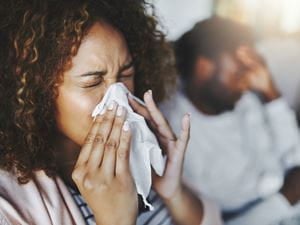
Grass, trees, mold, and pollen are only a few of the things that people who experience seasonal allergies are constantly doing their best to avoid. Those who are allergic to these plants know that congestion, sneezing and itchy red eyes are some of the token symptoms they experience when coming into contact with them.
However, seasonal allergies can cause some strange signs that, a lot of times, patients don’t associate with seasonal allergies. From feeling like you’re going to tip over to snoring, here are some lesser-known signs that you might be suffering from allergies.
1. Bad Breath
That awful taste in your mouth might not be from food. It could be due to pollen in the air. According to Dr. Duyen Nguyen, an allergist from Memorial Hermann Health System, when too much nasal discharge slides down the back of your throat, patients can feel nausea or vomit. This sensation can give bacteria in the throat and mouth a place to spread, leading to characteristic bad breath.
2. Loss of Smell
In recent years, a loss of smell has been associated with a COVID-19 infection, but it could also be due to allergies. Dr. Nguyen says that seasonal allergic patients can sometimes have anosmia, which is the full or partial loss of smell. He added that anosmia can happen when mucous membranes in the nose are significantly obstructed or irritated.
3. Dizziness
If you’re feeling like you’re going to fall and can’t blame it on having too much fun at happy hour, then your allergies might be the culprit. A consistent mucus build-up in the Eustachian tubes, which connect the inner ear and mouth, can create pressure inside your ears. According to Dr. Nguyen, this can potentially lead to chronic ear pain or cause you to feel off balance.
4. Exhaustion
If you’re feeling more exhausted than usual or not getting enough restful sleep, it could be due to allergy symptoms keeping you up at night. Dr. Julie Wendt, an allergist from Scottsdale, Arizona, says that in addition to allergy symptoms affecting the quality of sleep, they can also worsen sleep issues like sleep apnea, which can also impact the quantity of sleep. It could also be due to what allergists call “allergy fatigue syndrome.” Fighting out allergies all day can make your body tired, which leaves you with a lot less energy throughout the day.
5. Problems with Concentrating
With allergies, some people report having difficulty concentrating, brain fog, and even some ADHD symptoms. Doctors attribute this to your body using energy on other things like rubbing your eyes or nose, which causes a loss of expendable energy needed to focus. There have been some studies that show that people with allergies have a higher likelihood of having ADHD than the general population. One study found there’s strong evidence for the link between ADHD and allergies, noting that patients with allergies have a 30 to 50 percent greater risk of developing ADHD.
6. A Sore Throat
A sore throat can be a symptom of a virus, like the flu or common cold, but it could also be an indicator that the body is fighting off seasonal allergies. A sore throat could be due to the increased mucus production in the body, causing postnasal drip, which is the main troublemaker of a sore throat. In addition to postnasal drip, experts warn that a sore throat could be caused by the increased use of antihistamines, which cause excessive dryness. Increased coughing and sneezing from postnasal drip is also a symptom that can lead to throat irritation.
7. Snoring
Common sleep disorders like sleep apnea can cause excessive snoring, but increased congestion could also be the culprit. Nasal congestion from allergy symptoms increases snoring due to restricting airways and impacting the quality of sleep overall. Overall, untreated allergies can lead to chronic sleep disruptions and have a long-term effect on health, leading to heart failure, higher blood pressure, and weight gain.
8. Changes in Your Voice
Clearing your throat or other strange sounds can be another sign of allergies. Cluckling, like a chicken, is one way to rub the back of the roof of the mouth, where the allergy cells are found, just like you would scratch an itch. Sometimes, people are clucking subconsciously.
9. Unexplained Headaches
An increase in sinus pressure from congestion may just be the reason behind your unexplained headaches. Sinus headaches are typically located in the front of the forehead and cheeks, leaving the area tender. They are typically the worst in the morning because of pressure build-up from lying flat all night and often become less intense as the day goes on. This is due to swelling in the sinus cavities, blocking any drainage that could relieve pressure.
10. An Itchy Tongue
Your tongue or mouth gets itchy while eating a specific food, but that doesn’t mean you’re allergic to that food. It could mean that the food cross-reacts with another allergen. One example is bananas and ragweed. This is known as oral allergy syndrome, or OAS, and happens when patients with seasonal allergic rhinitis eat a vegetable, fruit, nut, or spice that cross-reacts. It can typically be suppressed by cooking the food.
11. Ringing in Your Ears
Ringing in your ears can happen from pressure building up due to congestion, which can block the Eustachian tubes, causing irritation and inflammation. People suffering from seasonal allergies also have an increased risk for ear infections as the ear can’t drain any excess fluid properly. Research also shows that patients who experience seasonal allergies are significantly more likely to have Eustachian tube dysfunction, another leading cause of tinnitus.
If you’re experiencing any of these symptoms or the classic symptoms of your body fighting allergens, there are many ways to find relief. To start, you should make an appointment with an allergist to determine what you’re allergic to.

